Consumer Behaviour and the Debate Around Ethical Consumerism
VerifiedAdded on 2023/04/22
|10
|2764
|277
Essay
AI Summary
This essay explores consumer behavior in the context of ethical consumerism, examining whether the concept of an 'ethical consumer' is a myth. It discusses how increasing global awareness and technological advancements have influenced consumer expectations regarding product ethics and social responsibility. The essay delves into factors affecting consumer decisions, including internal elements like perception, motivation, and attitude, as well as external influences such as social norms and cultural values. It references theories like Maslow's hierarchy of needs and motivation theory to explain how companies design marketing campaigns to appeal to diverse consumer needs. Ultimately, the analysis concludes that while consumers are increasingly aware of ethical issues, their buying behavior is complex, often driven by trends, personal needs, and brand appeal rather than purely rational ethical considerations. The document is available on Desklib, a platform offering a variety of study resources for students.
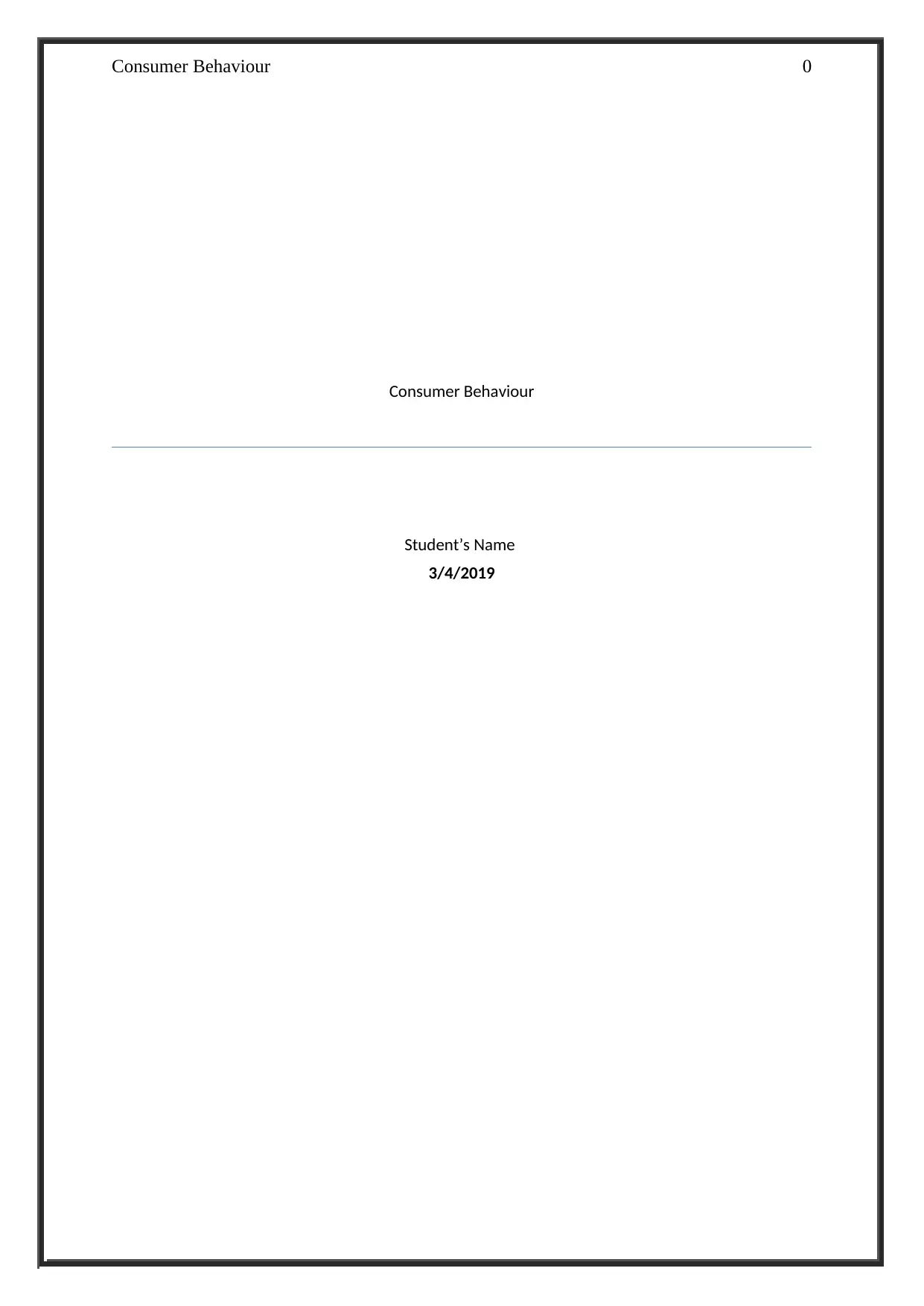
Consumer Behaviour 0
Consumer Behaviour
Student’s Name
3/4/2019
Consumer Behaviour
Student’s Name
3/4/2019
Paraphrase This Document
Need a fresh take? Get an instant paraphrase of this document with our AI Paraphraser
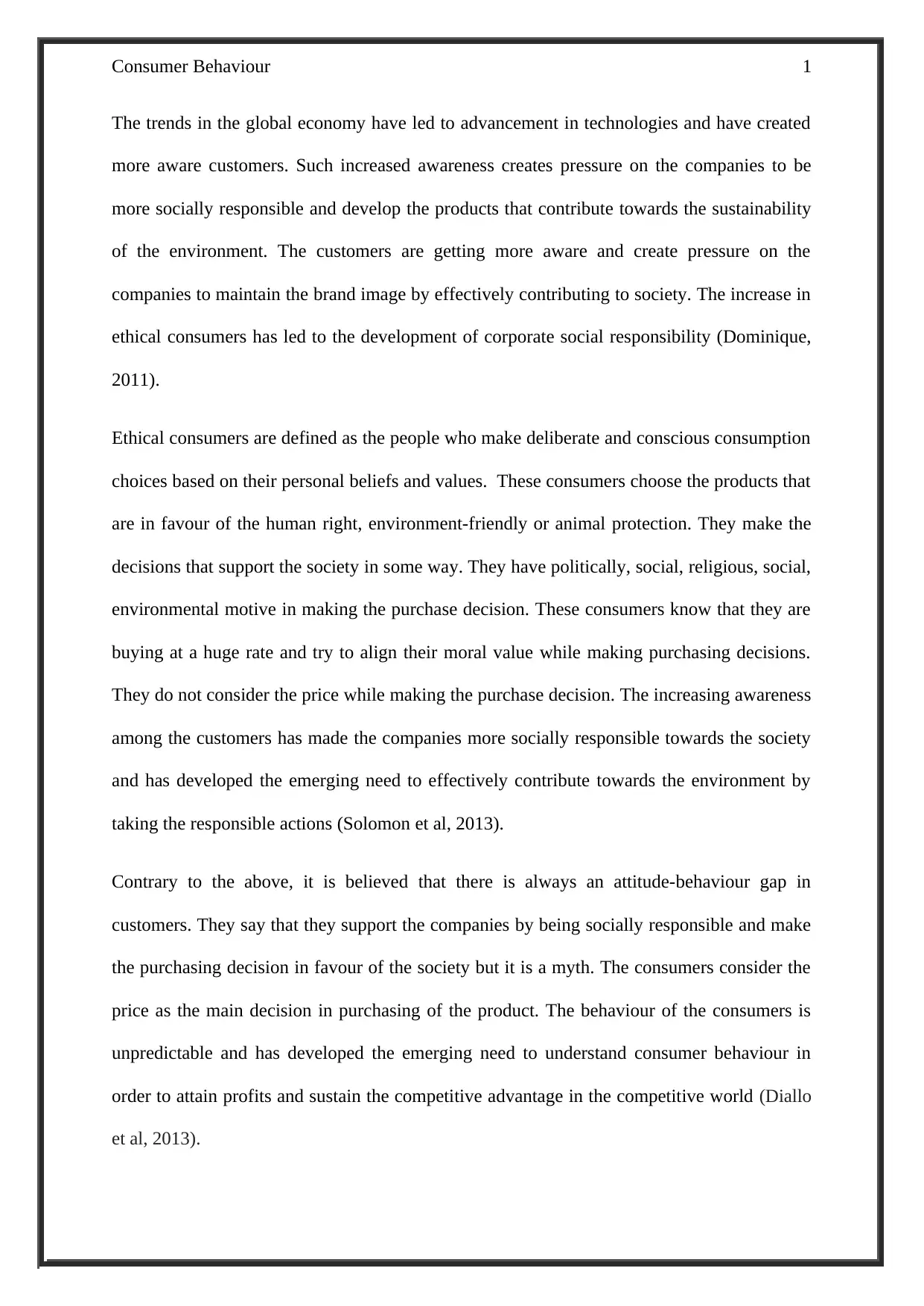
Consumer Behaviour 1
The trends in the global economy have led to advancement in technologies and have created
more aware customers. Such increased awareness creates pressure on the companies to be
more socially responsible and develop the products that contribute towards the sustainability
of the environment. The customers are getting more aware and create pressure on the
companies to maintain the brand image by effectively contributing to society. The increase in
ethical consumers has led to the development of corporate social responsibility (Dominique,
2011).
Ethical consumers are defined as the people who make deliberate and conscious consumption
choices based on their personal beliefs and values. These consumers choose the products that
are in favour of the human right, environment-friendly or animal protection. They make the
decisions that support the society in some way. They have politically, social, religious, social,
environmental motive in making the purchase decision. These consumers know that they are
buying at a huge rate and try to align their moral value while making purchasing decisions.
They do not consider the price while making the purchase decision. The increasing awareness
among the customers has made the companies more socially responsible towards the society
and has developed the emerging need to effectively contribute towards the environment by
taking the responsible actions (Solomon et al, 2013).
Contrary to the above, it is believed that there is always an attitude-behaviour gap in
customers. They say that they support the companies by being socially responsible and make
the purchasing decision in favour of the society but it is a myth. The consumers consider the
price as the main decision in purchasing of the product. The behaviour of the consumers is
unpredictable and has developed the emerging need to understand consumer behaviour in
order to attain profits and sustain the competitive advantage in the competitive world (Diallo
et al, 2013).
The trends in the global economy have led to advancement in technologies and have created
more aware customers. Such increased awareness creates pressure on the companies to be
more socially responsible and develop the products that contribute towards the sustainability
of the environment. The customers are getting more aware and create pressure on the
companies to maintain the brand image by effectively contributing to society. The increase in
ethical consumers has led to the development of corporate social responsibility (Dominique,
2011).
Ethical consumers are defined as the people who make deliberate and conscious consumption
choices based on their personal beliefs and values. These consumers choose the products that
are in favour of the human right, environment-friendly or animal protection. They make the
decisions that support the society in some way. They have politically, social, religious, social,
environmental motive in making the purchase decision. These consumers know that they are
buying at a huge rate and try to align their moral value while making purchasing decisions.
They do not consider the price while making the purchase decision. The increasing awareness
among the customers has made the companies more socially responsible towards the society
and has developed the emerging need to effectively contribute towards the environment by
taking the responsible actions (Solomon et al, 2013).
Contrary to the above, it is believed that there is always an attitude-behaviour gap in
customers. They say that they support the companies by being socially responsible and make
the purchasing decision in favour of the society but it is a myth. The consumers consider the
price as the main decision in purchasing of the product. The behaviour of the consumers is
unpredictable and has developed the emerging need to understand consumer behaviour in
order to attain profits and sustain the competitive advantage in the competitive world (Diallo
et al, 2013).
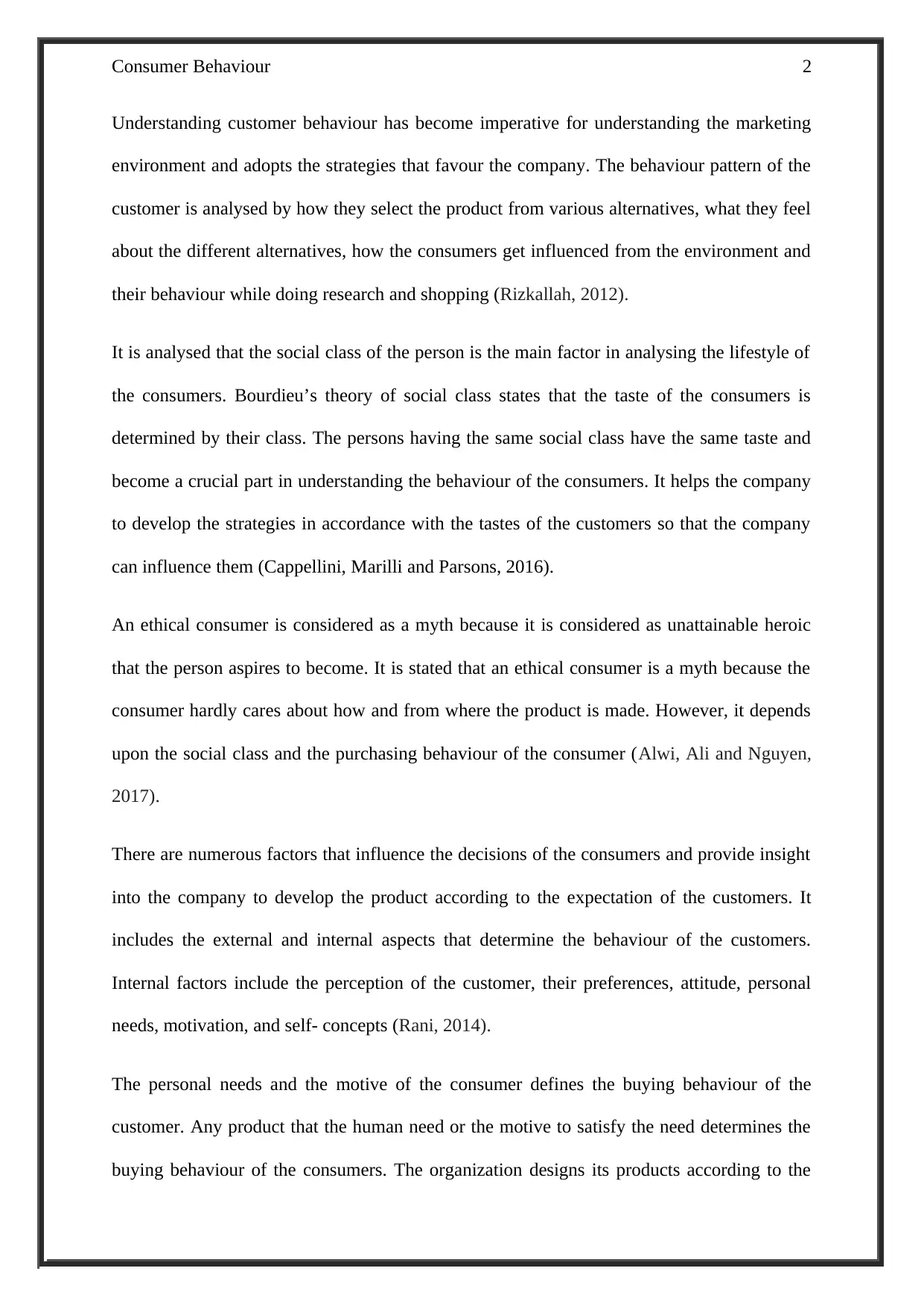
Consumer Behaviour 2
Understanding customer behaviour has become imperative for understanding the marketing
environment and adopts the strategies that favour the company. The behaviour pattern of the
customer is analysed by how they select the product from various alternatives, what they feel
about the different alternatives, how the consumers get influenced from the environment and
their behaviour while doing research and shopping (Rizkallah, 2012).
It is analysed that the social class of the person is the main factor in analysing the lifestyle of
the consumers. Bourdieu’s theory of social class states that the taste of the consumers is
determined by their class. The persons having the same social class have the same taste and
become a crucial part in understanding the behaviour of the consumers. It helps the company
to develop the strategies in accordance with the tastes of the customers so that the company
can influence them (Cappellini, Marilli and Parsons, 2016).
An ethical consumer is considered as a myth because it is considered as unattainable heroic
that the person aspires to become. It is stated that an ethical consumer is a myth because the
consumer hardly cares about how and from where the product is made. However, it depends
upon the social class and the purchasing behaviour of the consumer (Alwi, Ali and Nguyen,
2017).
There are numerous factors that influence the decisions of the consumers and provide insight
into the company to develop the product according to the expectation of the customers. It
includes the external and internal aspects that determine the behaviour of the customers.
Internal factors include the perception of the customer, their preferences, attitude, personal
needs, motivation, and self- concepts (Rani, 2014).
The personal needs and the motive of the consumer defines the buying behaviour of the
customer. Any product that the human need or the motive to satisfy the need determines the
buying behaviour of the consumers. The organization designs its products according to the
Understanding customer behaviour has become imperative for understanding the marketing
environment and adopts the strategies that favour the company. The behaviour pattern of the
customer is analysed by how they select the product from various alternatives, what they feel
about the different alternatives, how the consumers get influenced from the environment and
their behaviour while doing research and shopping (Rizkallah, 2012).
It is analysed that the social class of the person is the main factor in analysing the lifestyle of
the consumers. Bourdieu’s theory of social class states that the taste of the consumers is
determined by their class. The persons having the same social class have the same taste and
become a crucial part in understanding the behaviour of the consumers. It helps the company
to develop the strategies in accordance with the tastes of the customers so that the company
can influence them (Cappellini, Marilli and Parsons, 2016).
An ethical consumer is considered as a myth because it is considered as unattainable heroic
that the person aspires to become. It is stated that an ethical consumer is a myth because the
consumer hardly cares about how and from where the product is made. However, it depends
upon the social class and the purchasing behaviour of the consumer (Alwi, Ali and Nguyen,
2017).
There are numerous factors that influence the decisions of the consumers and provide insight
into the company to develop the product according to the expectation of the customers. It
includes the external and internal aspects that determine the behaviour of the customers.
Internal factors include the perception of the customer, their preferences, attitude, personal
needs, motivation, and self- concepts (Rani, 2014).
The personal needs and the motive of the consumer defines the buying behaviour of the
customer. Any product that the human need or the motive to satisfy the need determines the
buying behaviour of the consumers. The organization designs its products according to the
⊘ This is a preview!⊘
Do you want full access?
Subscribe today to unlock all pages.

Trusted by 1+ million students worldwide
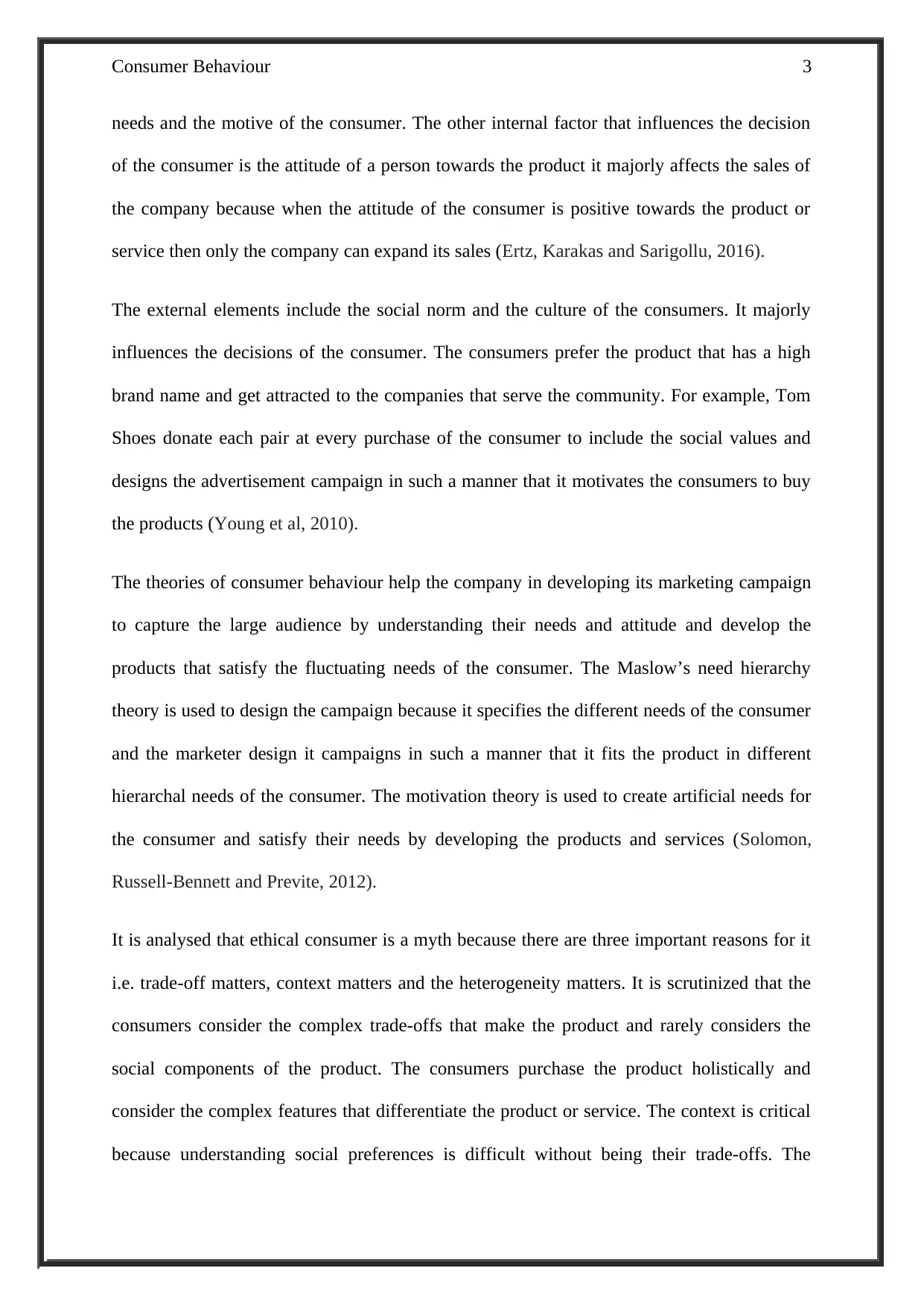
Consumer Behaviour 3
needs and the motive of the consumer. The other internal factor that influences the decision
of the consumer is the attitude of a person towards the product it majorly affects the sales of
the company because when the attitude of the consumer is positive towards the product or
service then only the company can expand its sales (Ertz, Karakas and Sarigollu, 2016).
The external elements include the social norm and the culture of the consumers. It majorly
influences the decisions of the consumer. The consumers prefer the product that has a high
brand name and get attracted to the companies that serve the community. For example, Tom
Shoes donate each pair at every purchase of the consumer to include the social values and
designs the advertisement campaign in such a manner that it motivates the consumers to buy
the products (Young et al, 2010).
The theories of consumer behaviour help the company in developing its marketing campaign
to capture the large audience by understanding their needs and attitude and develop the
products that satisfy the fluctuating needs of the consumer. The Maslow’s need hierarchy
theory is used to design the campaign because it specifies the different needs of the consumer
and the marketer design it campaigns in such a manner that it fits the product in different
hierarchal needs of the consumer. The motivation theory is used to create artificial needs for
the consumer and satisfy their needs by developing the products and services (Solomon,
Russell-Bennett and Previte, 2012).
It is analysed that ethical consumer is a myth because there are three important reasons for it
i.e. trade-off matters, context matters and the heterogeneity matters. It is scrutinized that the
consumers consider the complex trade-offs that make the product and rarely considers the
social components of the product. The consumers purchase the product holistically and
consider the complex features that differentiate the product or service. The context is critical
because understanding social preferences is difficult without being their trade-offs. The
needs and the motive of the consumer. The other internal factor that influences the decision
of the consumer is the attitude of a person towards the product it majorly affects the sales of
the company because when the attitude of the consumer is positive towards the product or
service then only the company can expand its sales (Ertz, Karakas and Sarigollu, 2016).
The external elements include the social norm and the culture of the consumers. It majorly
influences the decisions of the consumer. The consumers prefer the product that has a high
brand name and get attracted to the companies that serve the community. For example, Tom
Shoes donate each pair at every purchase of the consumer to include the social values and
designs the advertisement campaign in such a manner that it motivates the consumers to buy
the products (Young et al, 2010).
The theories of consumer behaviour help the company in developing its marketing campaign
to capture the large audience by understanding their needs and attitude and develop the
products that satisfy the fluctuating needs of the consumer. The Maslow’s need hierarchy
theory is used to design the campaign because it specifies the different needs of the consumer
and the marketer design it campaigns in such a manner that it fits the product in different
hierarchal needs of the consumer. The motivation theory is used to create artificial needs for
the consumer and satisfy their needs by developing the products and services (Solomon,
Russell-Bennett and Previte, 2012).
It is analysed that ethical consumer is a myth because there are three important reasons for it
i.e. trade-off matters, context matters and the heterogeneity matters. It is scrutinized that the
consumers consider the complex trade-offs that make the product and rarely considers the
social components of the product. The consumers purchase the product holistically and
consider the complex features that differentiate the product or service. The context is critical
because understanding social preferences is difficult without being their trade-offs. The
Paraphrase This Document
Need a fresh take? Get an instant paraphrase of this document with our AI Paraphraser
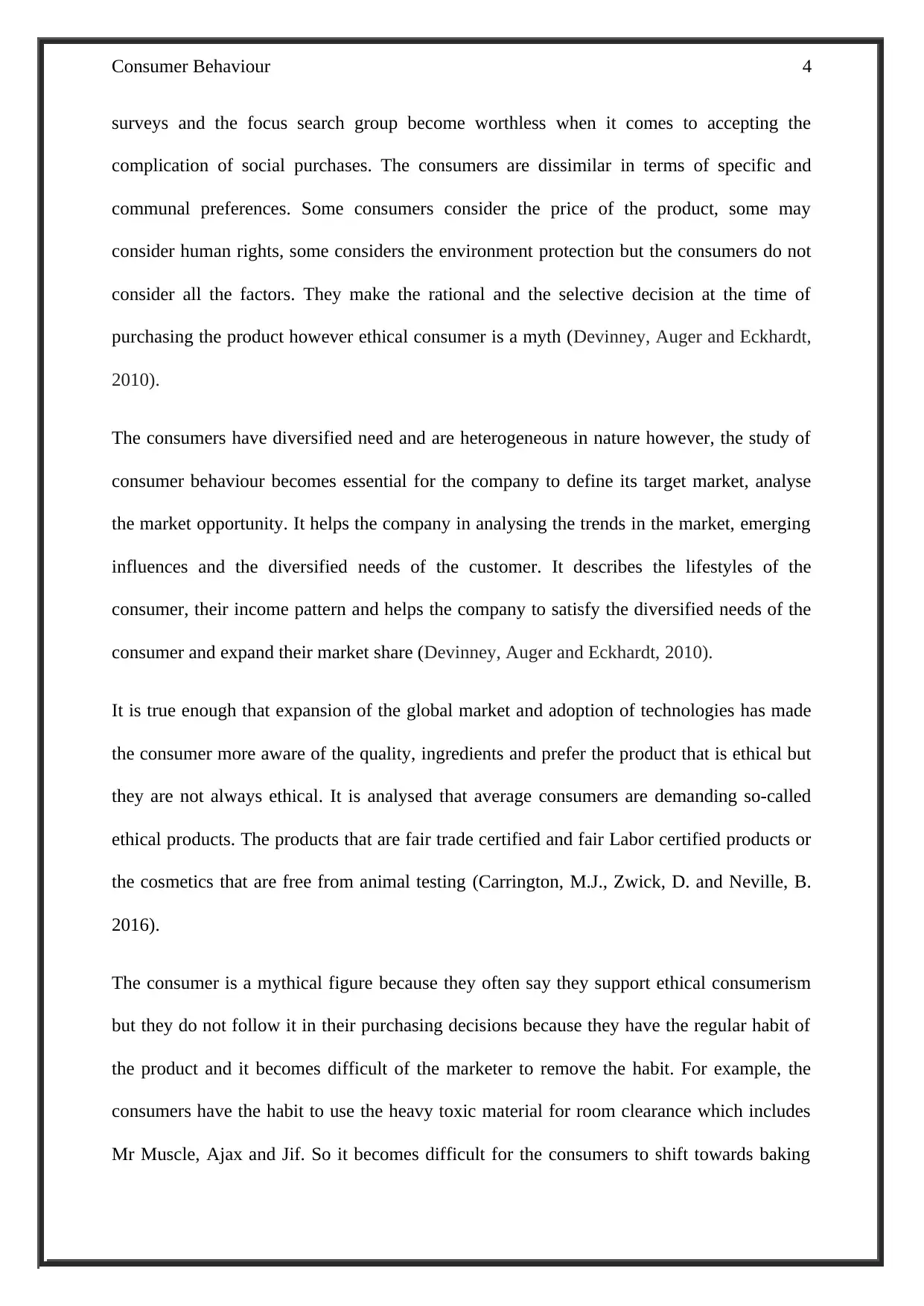
Consumer Behaviour 4
surveys and the focus search group become worthless when it comes to accepting the
complication of social purchases. The consumers are dissimilar in terms of specific and
communal preferences. Some consumers consider the price of the product, some may
consider human rights, some considers the environment protection but the consumers do not
consider all the factors. They make the rational and the selective decision at the time of
purchasing the product however ethical consumer is a myth (Devinney, Auger and Eckhardt,
2010).
The consumers have diversified need and are heterogeneous in nature however, the study of
consumer behaviour becomes essential for the company to define its target market, analyse
the market opportunity. It helps the company in analysing the trends in the market, emerging
influences and the diversified needs of the customer. It describes the lifestyles of the
consumer, their income pattern and helps the company to satisfy the diversified needs of the
consumer and expand their market share (Devinney, Auger and Eckhardt, 2010).
It is true enough that expansion of the global market and adoption of technologies has made
the consumer more aware of the quality, ingredients and prefer the product that is ethical but
they are not always ethical. It is analysed that average consumers are demanding so-called
ethical products. The products that are fair trade certified and fair Labor certified products or
the cosmetics that are free from animal testing (Carrington, M.J., Zwick, D. and Neville, B.
2016).
The consumer is a mythical figure because they often say they support ethical consumerism
but they do not follow it in their purchasing decisions because they have the regular habit of
the product and it becomes difficult of the marketer to remove the habit. For example, the
consumers have the habit to use the heavy toxic material for room clearance which includes
Mr Muscle, Ajax and Jif. So it becomes difficult for the consumers to shift towards baking
surveys and the focus search group become worthless when it comes to accepting the
complication of social purchases. The consumers are dissimilar in terms of specific and
communal preferences. Some consumers consider the price of the product, some may
consider human rights, some considers the environment protection but the consumers do not
consider all the factors. They make the rational and the selective decision at the time of
purchasing the product however ethical consumer is a myth (Devinney, Auger and Eckhardt,
2010).
The consumers have diversified need and are heterogeneous in nature however, the study of
consumer behaviour becomes essential for the company to define its target market, analyse
the market opportunity. It helps the company in analysing the trends in the market, emerging
influences and the diversified needs of the customer. It describes the lifestyles of the
consumer, their income pattern and helps the company to satisfy the diversified needs of the
consumer and expand their market share (Devinney, Auger and Eckhardt, 2010).
It is true enough that expansion of the global market and adoption of technologies has made
the consumer more aware of the quality, ingredients and prefer the product that is ethical but
they are not always ethical. It is analysed that average consumers are demanding so-called
ethical products. The products that are fair trade certified and fair Labor certified products or
the cosmetics that are free from animal testing (Carrington, M.J., Zwick, D. and Neville, B.
2016).
The consumer is a mythical figure because they often say they support ethical consumerism
but they do not follow it in their purchasing decisions because they have the regular habit of
the product and it becomes difficult of the marketer to remove the habit. For example, the
consumers have the habit to use the heavy toxic material for room clearance which includes
Mr Muscle, Ajax and Jif. So it becomes difficult for the consumers to shift towards baking
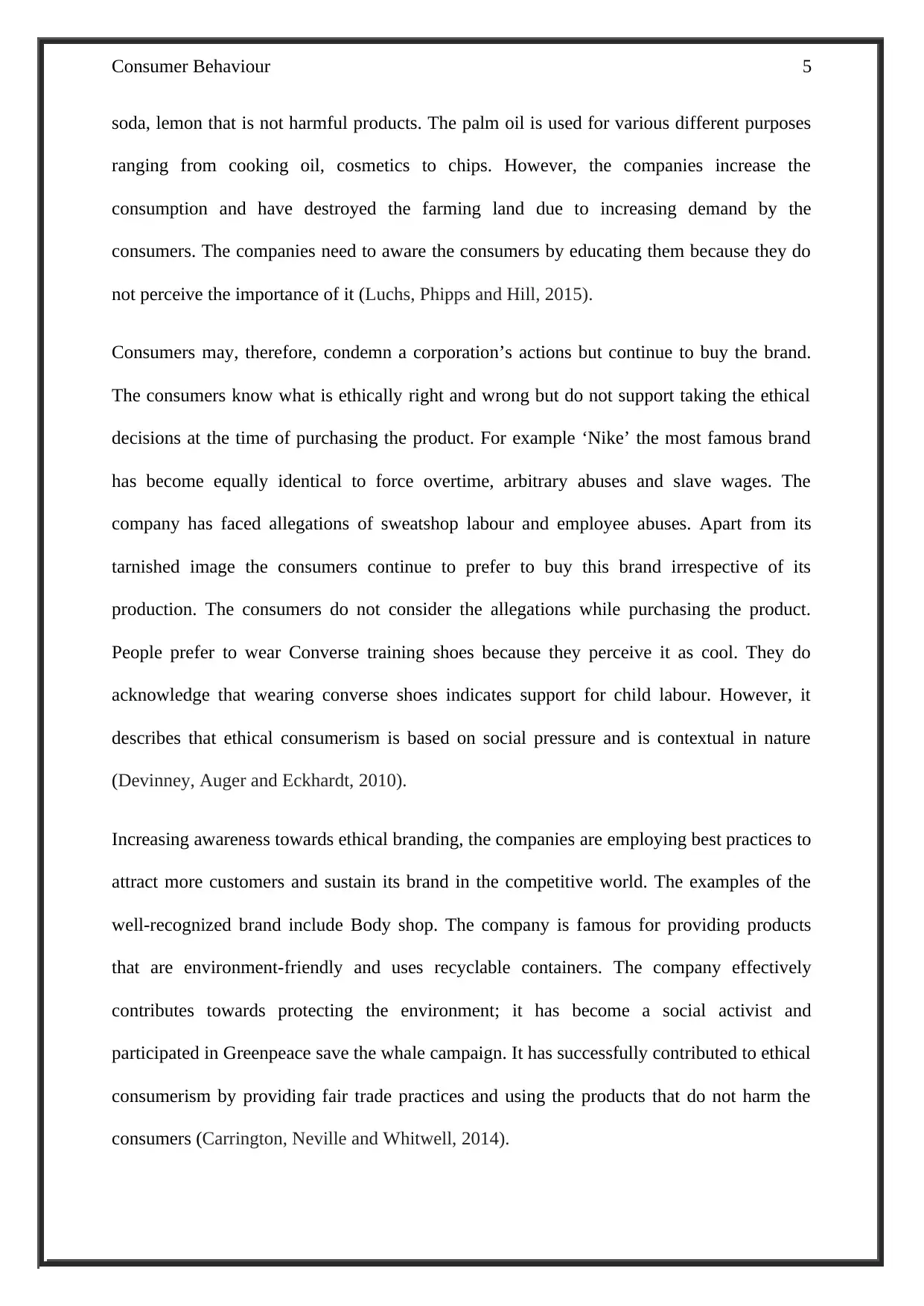
Consumer Behaviour 5
soda, lemon that is not harmful products. The palm oil is used for various different purposes
ranging from cooking oil, cosmetics to chips. However, the companies increase the
consumption and have destroyed the farming land due to increasing demand by the
consumers. The companies need to aware the consumers by educating them because they do
not perceive the importance of it (Luchs, Phipps and Hill, 2015).
Consumers may, therefore, condemn a corporation’s actions but continue to buy the brand.
The consumers know what is ethically right and wrong but do not support taking the ethical
decisions at the time of purchasing the product. For example ‘Nike’ the most famous brand
has become equally identical to force overtime, arbitrary abuses and slave wages. The
company has faced allegations of sweatshop labour and employee abuses. Apart from its
tarnished image the consumers continue to prefer to buy this brand irrespective of its
production. The consumers do not consider the allegations while purchasing the product.
People prefer to wear Converse training shoes because they perceive it as cool. They do
acknowledge that wearing converse shoes indicates support for child labour. However, it
describes that ethical consumerism is based on social pressure and is contextual in nature
(Devinney, Auger and Eckhardt, 2010).
Increasing awareness towards ethical branding, the companies are employing best practices to
attract more customers and sustain its brand in the competitive world. The examples of the
well-recognized brand include Body shop. The company is famous for providing products
that are environment-friendly and uses recyclable containers. The company effectively
contributes towards protecting the environment; it has become a social activist and
participated in Greenpeace save the whale campaign. It has successfully contributed to ethical
consumerism by providing fair trade practices and using the products that do not harm the
consumers (Carrington, Neville and Whitwell, 2014).
soda, lemon that is not harmful products. The palm oil is used for various different purposes
ranging from cooking oil, cosmetics to chips. However, the companies increase the
consumption and have destroyed the farming land due to increasing demand by the
consumers. The companies need to aware the consumers by educating them because they do
not perceive the importance of it (Luchs, Phipps and Hill, 2015).
Consumers may, therefore, condemn a corporation’s actions but continue to buy the brand.
The consumers know what is ethically right and wrong but do not support taking the ethical
decisions at the time of purchasing the product. For example ‘Nike’ the most famous brand
has become equally identical to force overtime, arbitrary abuses and slave wages. The
company has faced allegations of sweatshop labour and employee abuses. Apart from its
tarnished image the consumers continue to prefer to buy this brand irrespective of its
production. The consumers do not consider the allegations while purchasing the product.
People prefer to wear Converse training shoes because they perceive it as cool. They do
acknowledge that wearing converse shoes indicates support for child labour. However, it
describes that ethical consumerism is based on social pressure and is contextual in nature
(Devinney, Auger and Eckhardt, 2010).
Increasing awareness towards ethical branding, the companies are employing best practices to
attract more customers and sustain its brand in the competitive world. The examples of the
well-recognized brand include Body shop. The company is famous for providing products
that are environment-friendly and uses recyclable containers. The company effectively
contributes towards protecting the environment; it has become a social activist and
participated in Greenpeace save the whale campaign. It has successfully contributed to ethical
consumerism by providing fair trade practices and using the products that do not harm the
consumers (Carrington, Neville and Whitwell, 2014).
⊘ This is a preview!⊘
Do you want full access?
Subscribe today to unlock all pages.

Trusted by 1+ million students worldwide
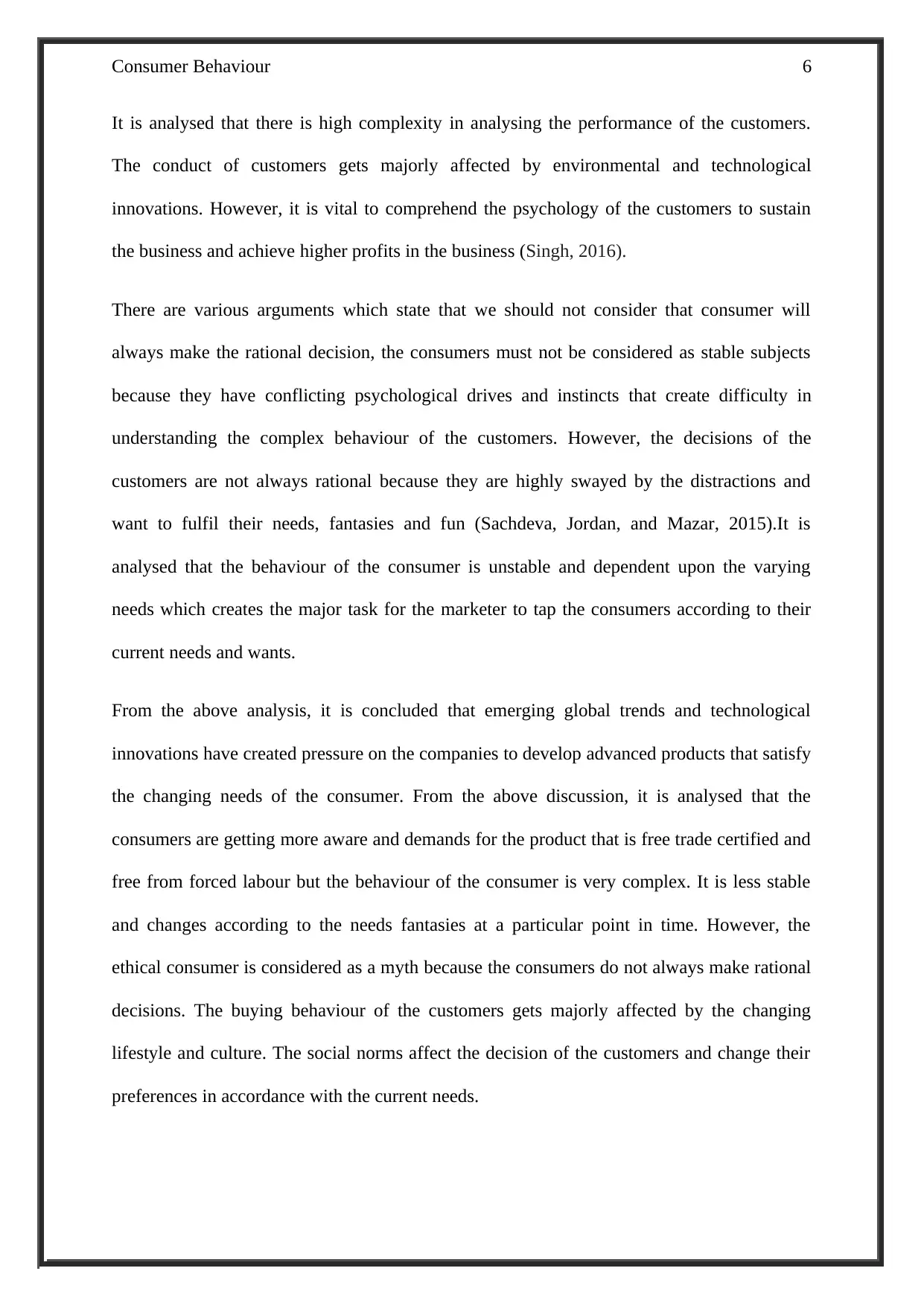
Consumer Behaviour 6
It is analysed that there is high complexity in analysing the performance of the customers.
The conduct of customers gets majorly affected by environmental and technological
innovations. However, it is vital to comprehend the psychology of the customers to sustain
the business and achieve higher profits in the business (Singh, 2016).
There are various arguments which state that we should not consider that consumer will
always make the rational decision, the consumers must not be considered as stable subjects
because they have conflicting psychological drives and instincts that create difficulty in
understanding the complex behaviour of the customers. However, the decisions of the
customers are not always rational because they are highly swayed by the distractions and
want to fulfil their needs, fantasies and fun (Sachdeva, Jordan, and Mazar, 2015).It is
analysed that the behaviour of the consumer is unstable and dependent upon the varying
needs which creates the major task for the marketer to tap the consumers according to their
current needs and wants.
From the above analysis, it is concluded that emerging global trends and technological
innovations have created pressure on the companies to develop advanced products that satisfy
the changing needs of the consumer. From the above discussion, it is analysed that the
consumers are getting more aware and demands for the product that is free trade certified and
free from forced labour but the behaviour of the consumer is very complex. It is less stable
and changes according to the needs fantasies at a particular point in time. However, the
ethical consumer is considered as a myth because the consumers do not always make rational
decisions. The buying behaviour of the customers gets majorly affected by the changing
lifestyle and culture. The social norms affect the decision of the customers and change their
preferences in accordance with the current needs.
It is analysed that there is high complexity in analysing the performance of the customers.
The conduct of customers gets majorly affected by environmental and technological
innovations. However, it is vital to comprehend the psychology of the customers to sustain
the business and achieve higher profits in the business (Singh, 2016).
There are various arguments which state that we should not consider that consumer will
always make the rational decision, the consumers must not be considered as stable subjects
because they have conflicting psychological drives and instincts that create difficulty in
understanding the complex behaviour of the customers. However, the decisions of the
customers are not always rational because they are highly swayed by the distractions and
want to fulfil their needs, fantasies and fun (Sachdeva, Jordan, and Mazar, 2015).It is
analysed that the behaviour of the consumer is unstable and dependent upon the varying
needs which creates the major task for the marketer to tap the consumers according to their
current needs and wants.
From the above analysis, it is concluded that emerging global trends and technological
innovations have created pressure on the companies to develop advanced products that satisfy
the changing needs of the consumer. From the above discussion, it is analysed that the
consumers are getting more aware and demands for the product that is free trade certified and
free from forced labour but the behaviour of the consumer is very complex. It is less stable
and changes according to the needs fantasies at a particular point in time. However, the
ethical consumer is considered as a myth because the consumers do not always make rational
decisions. The buying behaviour of the customers gets majorly affected by the changing
lifestyle and culture. The social norms affect the decision of the customers and change their
preferences in accordance with the current needs.
Paraphrase This Document
Need a fresh take? Get an instant paraphrase of this document with our AI Paraphraser
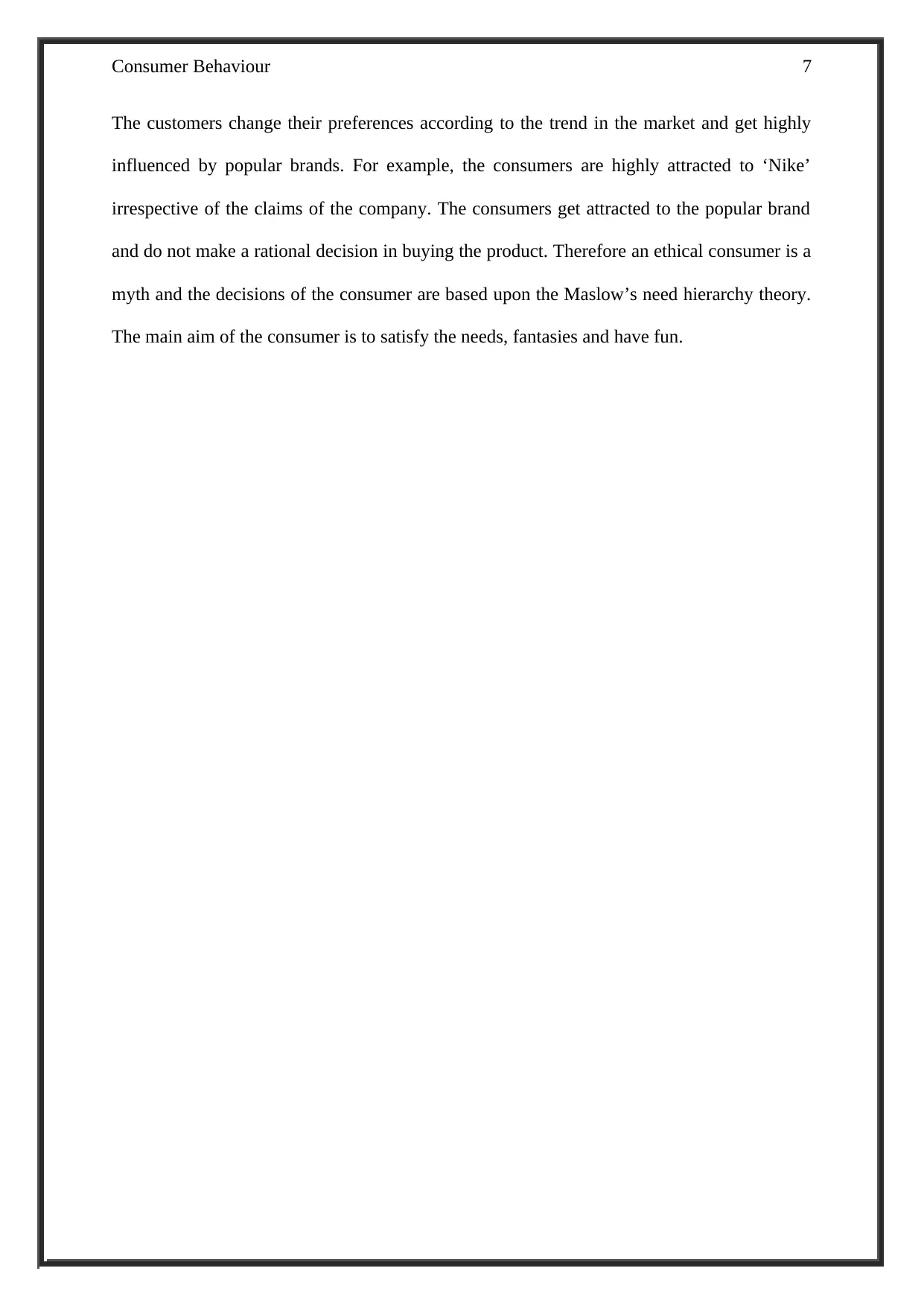
Consumer Behaviour 7
The customers change their preferences according to the trend in the market and get highly
influenced by popular brands. For example, the consumers are highly attracted to ‘Nike’
irrespective of the claims of the company. The consumers get attracted to the popular brand
and do not make a rational decision in buying the product. Therefore an ethical consumer is a
myth and the decisions of the consumer are based upon the Maslow’s need hierarchy theory.
The main aim of the consumer is to satisfy the needs, fantasies and have fun.
The customers change their preferences according to the trend in the market and get highly
influenced by popular brands. For example, the consumers are highly attracted to ‘Nike’
irrespective of the claims of the company. The consumers get attracted to the popular brand
and do not make a rational decision in buying the product. Therefore an ethical consumer is a
myth and the decisions of the consumer are based upon the Maslow’s need hierarchy theory.
The main aim of the consumer is to satisfy the needs, fantasies and have fun.
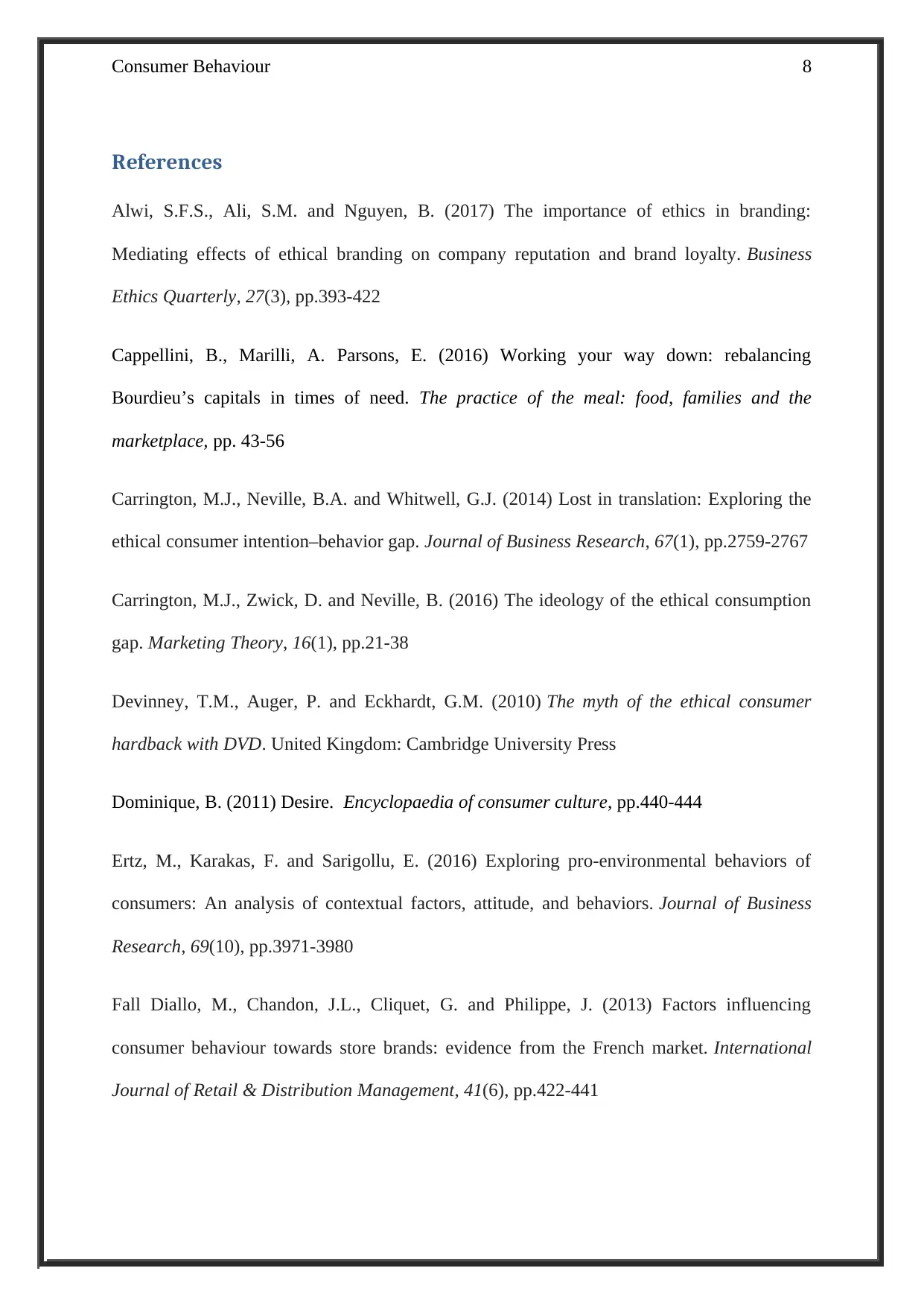
Consumer Behaviour 8
References
Alwi, S.F.S., Ali, S.M. and Nguyen, B. (2017) The importance of ethics in branding:
Mediating effects of ethical branding on company reputation and brand loyalty. Business
Ethics Quarterly, 27(3), pp.393-422
Cappellini, B., Marilli, A. Parsons, E. (2016) Working your way down: rebalancing
Bourdieu’s capitals in times of need. The practice of the meal: food, families and the
marketplace, pp. 43-56
Carrington, M.J., Neville, B.A. and Whitwell, G.J. (2014) Lost in translation: Exploring the
ethical consumer intention–behavior gap. Journal of Business Research, 67(1), pp.2759-2767
Carrington, M.J., Zwick, D. and Neville, B. (2016) The ideology of the ethical consumption
gap. Marketing Theory, 16(1), pp.21-38
Devinney, T.M., Auger, P. and Eckhardt, G.M. (2010) The myth of the ethical consumer
hardback with DVD. United Kingdom: Cambridge University Press
Dominique, B. (2011) Desire. Encyclopaedia of consumer culture, pp.440-444
Ertz, M., Karakas, F. and Sarigollu, E. (2016) Exploring pro-environmental behaviors of
consumers: An analysis of contextual factors, attitude, and behaviors. Journal of Business
Research, 69(10), pp.3971-3980
Fall Diallo, M., Chandon, J.L., Cliquet, G. and Philippe, J. (2013) Factors influencing
consumer behaviour towards store brands: evidence from the French market. International
Journal of Retail & Distribution Management, 41(6), pp.422-441
References
Alwi, S.F.S., Ali, S.M. and Nguyen, B. (2017) The importance of ethics in branding:
Mediating effects of ethical branding on company reputation and brand loyalty. Business
Ethics Quarterly, 27(3), pp.393-422
Cappellini, B., Marilli, A. Parsons, E. (2016) Working your way down: rebalancing
Bourdieu’s capitals in times of need. The practice of the meal: food, families and the
marketplace, pp. 43-56
Carrington, M.J., Neville, B.A. and Whitwell, G.J. (2014) Lost in translation: Exploring the
ethical consumer intention–behavior gap. Journal of Business Research, 67(1), pp.2759-2767
Carrington, M.J., Zwick, D. and Neville, B. (2016) The ideology of the ethical consumption
gap. Marketing Theory, 16(1), pp.21-38
Devinney, T.M., Auger, P. and Eckhardt, G.M. (2010) The myth of the ethical consumer
hardback with DVD. United Kingdom: Cambridge University Press
Dominique, B. (2011) Desire. Encyclopaedia of consumer culture, pp.440-444
Ertz, M., Karakas, F. and Sarigollu, E. (2016) Exploring pro-environmental behaviors of
consumers: An analysis of contextual factors, attitude, and behaviors. Journal of Business
Research, 69(10), pp.3971-3980
Fall Diallo, M., Chandon, J.L., Cliquet, G. and Philippe, J. (2013) Factors influencing
consumer behaviour towards store brands: evidence from the French market. International
Journal of Retail & Distribution Management, 41(6), pp.422-441
⊘ This is a preview!⊘
Do you want full access?
Subscribe today to unlock all pages.

Trusted by 1+ million students worldwide
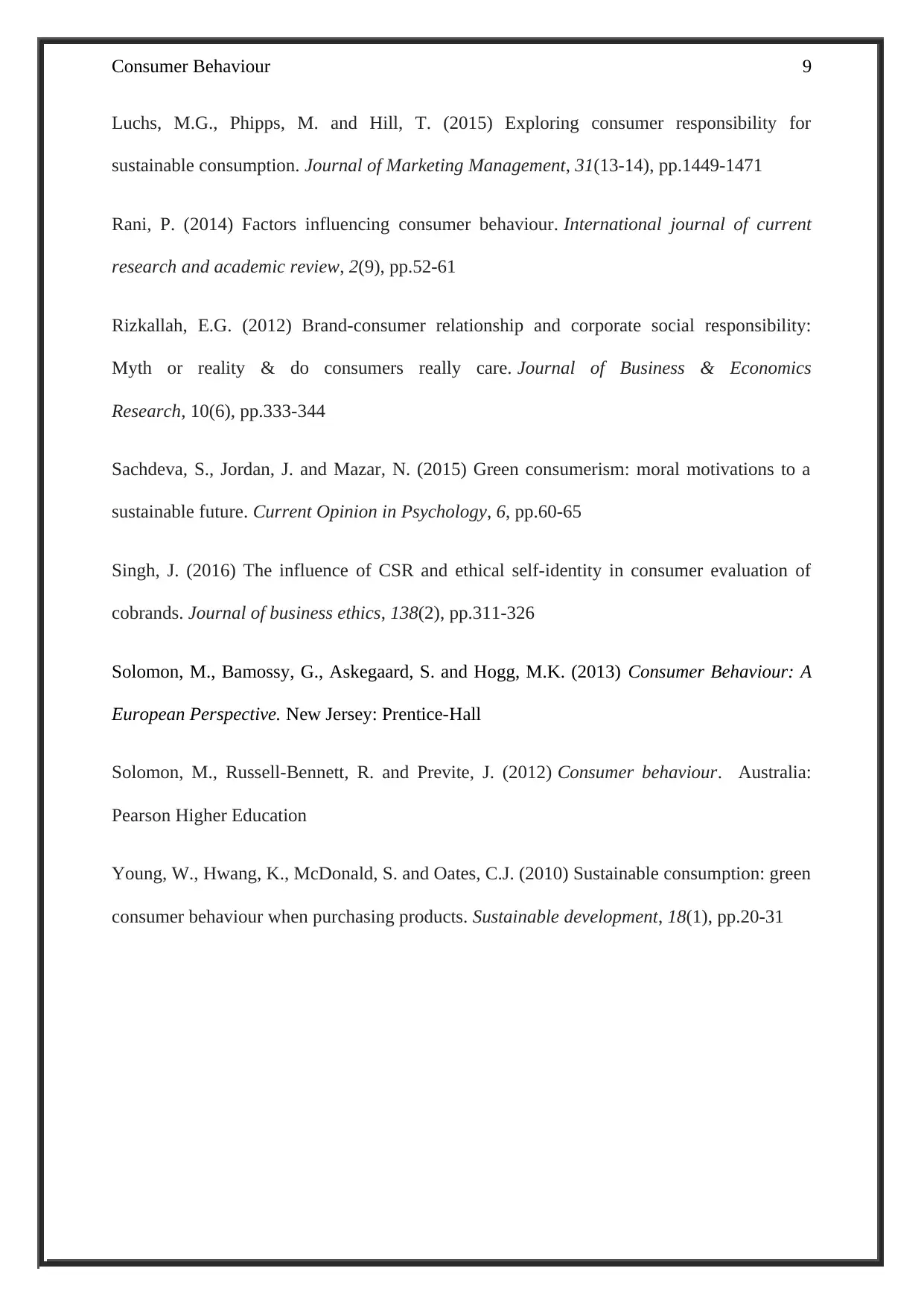
Consumer Behaviour 9
Luchs, M.G., Phipps, M. and Hill, T. (2015) Exploring consumer responsibility for
sustainable consumption. Journal of Marketing Management, 31(13-14), pp.1449-1471
Rani, P. (2014) Factors influencing consumer behaviour. International journal of current
research and academic review, 2(9), pp.52-61
Rizkallah, E.G. (2012) Brand-consumer relationship and corporate social responsibility:
Myth or reality & do consumers really care. Journal of Business & Economics
Research, 10(6), pp.333-344
Sachdeva, S., Jordan, J. and Mazar, N. (2015) Green consumerism: moral motivations to a
sustainable future. Current Opinion in Psychology, 6, pp.60-65
Singh, J. (2016) The influence of CSR and ethical self-identity in consumer evaluation of
cobrands. Journal of business ethics, 138(2), pp.311-326
Solomon, M., Bamossy, G., Askegaard, S. and Hogg, M.K. (2013) Consumer Behaviour: A
European Perspective. New Jersey: Prentice-Hall
Solomon, M., Russell-Bennett, R. and Previte, J. (2012) Consumer behaviour. Australia:
Pearson Higher Education
Young, W., Hwang, K., McDonald, S. and Oates, C.J. (2010) Sustainable consumption: green
consumer behaviour when purchasing products. Sustainable development, 18(1), pp.20-31
Luchs, M.G., Phipps, M. and Hill, T. (2015) Exploring consumer responsibility for
sustainable consumption. Journal of Marketing Management, 31(13-14), pp.1449-1471
Rani, P. (2014) Factors influencing consumer behaviour. International journal of current
research and academic review, 2(9), pp.52-61
Rizkallah, E.G. (2012) Brand-consumer relationship and corporate social responsibility:
Myth or reality & do consumers really care. Journal of Business & Economics
Research, 10(6), pp.333-344
Sachdeva, S., Jordan, J. and Mazar, N. (2015) Green consumerism: moral motivations to a
sustainable future. Current Opinion in Psychology, 6, pp.60-65
Singh, J. (2016) The influence of CSR and ethical self-identity in consumer evaluation of
cobrands. Journal of business ethics, 138(2), pp.311-326
Solomon, M., Bamossy, G., Askegaard, S. and Hogg, M.K. (2013) Consumer Behaviour: A
European Perspective. New Jersey: Prentice-Hall
Solomon, M., Russell-Bennett, R. and Previte, J. (2012) Consumer behaviour. Australia:
Pearson Higher Education
Young, W., Hwang, K., McDonald, S. and Oates, C.J. (2010) Sustainable consumption: green
consumer behaviour when purchasing products. Sustainable development, 18(1), pp.20-31
1 out of 10
Related Documents
Your All-in-One AI-Powered Toolkit for Academic Success.
+13062052269
info@desklib.com
Available 24*7 on WhatsApp / Email
![[object Object]](/_next/static/media/star-bottom.7253800d.svg)
Unlock your academic potential
Copyright © 2020–2026 A2Z Services. All Rights Reserved. Developed and managed by ZUCOL.





